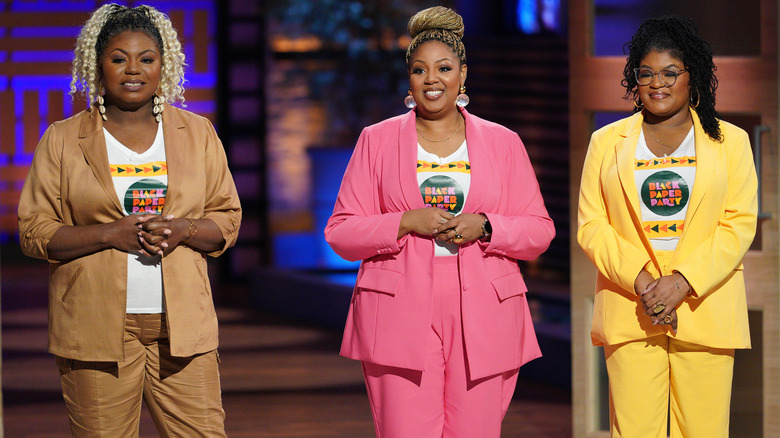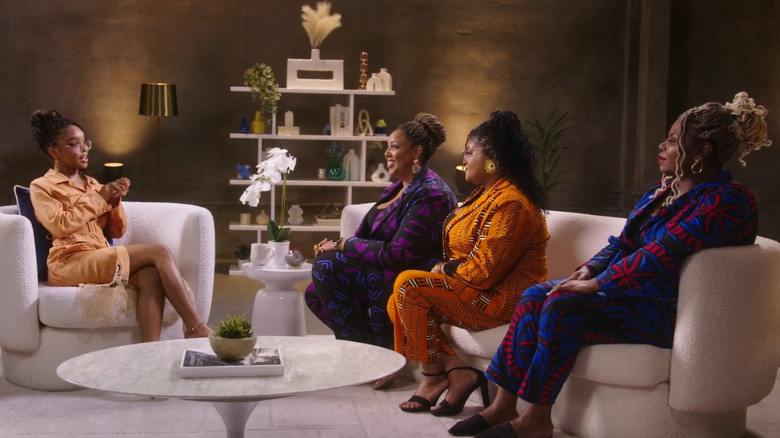Black Paper Party: 3 Things You Didn't Know About The Shark Tank Brand
The holidays should be special for all, but the imagery associated with these festive times has remained very much the same over the years. So it should come as no surprise that our increasingly diversity-aware world would birth a new company that is working to make that holly jolly change.
Enter Black Paper Party, a Black women-owned operation that has created a line of holiday decor items and accessories that bring authentic representation to the African American community. The company offers no shortage of excellently designed products, from decorative mugs and mixing bowls to wrapping paper and ornaments and everything in between. What unites all their work is the celebration of inclusivity, showcasing Black individuals of all ages, body types, skin tones, and hair varieties.
Spreading the power of positive representation matters regardless of the time of year, but can mean something extra special for people around the holidays. The team behind Black Paper Party will have the opportunity to share their message on a bigger platform than ever when they appear on this Friday's Season 15 episode of "Shark Tank." Let's highlight some interesting facts about the group before we find out if the sharks gave them the Christmas miracle they've been waiting for.
Black Paper Psrty's three founders have made major achievements in their fields
All three Black Paper Party co-founders, despite coming from varied backgrounds, possess the same passion for seeing a more open-minded world. After returning from her studies in Ghana, CEO Madia Willis launched her fashion line and was later employed at major companies such as Target and Walmart as a textile designer. Willis later transitioned into product development and management roles at Walmart and Five Below, where she further developed several home and seasonal brands.
Chief Creative Officer J'aaron Merchant has a wealth of experience in illustration and animation. Having graduated from the Savannah College of Art and Design with a degree in animation, Merchant has worked as a character designer and storyboard artist for brands such as Sesame Street and Disney. Along with this, she has also done extensive volunteer work for organizations such as the Crystal Bridges Museum of American Art and Havenwood.
Jasmine Hudson serves as Black Paper's Chief Merchant. Through her many endeavors in the e-commerce and supply management space, the Cincinnati native has strived to champion the voices of the Black community. Hudson spent almost a decade at Walmart in various merchandise and financial positions, handling portfolios worth more than $2.3 billion in annual revenue. During this time, she also drove key programming events and initiatives to encourage diversity and inclusion.
Willis met Merchant and Hudson among moving to Arkansas. The three wanted to find a way to combine their skills and soon discovered that African Americans spend 15% more during the holiday season than other demographics on average. Realizing the lack of inclusive seasonal brands on the market, the trio decided to go all-in on the venture and launched their business in September 2020.
Black Paper Party has partnered with major brands and celebrities
While still in its startup phase, Black Paper Party has already hit some pretty big strides as a company. Its bold mission and unique niche have attracted media attention from the likes of Ebony, "The Kelly Clarkson Show," "Today," BuzzFeed, Black Enterprise, Women's Wear Daily, Bloomberg, and many more.
Possibly even more impressive are the other major brands, events, and celebrities that have supported Black Paper Party's cause. In late 2021, the company was included among several Black-owned businesses in Los Angeles' ByBlack Bazaar pop-up marketplace, a certification and directory event curated by American Express and "Insecure" star Issa Rae. The following year would see Black Paper win a $100,000 business grant from The Workshop at Macy's Pitch Competition. More recently, the team entered a new collaboration with Walmart, which will see a specially curated line of fan-favorite holiday products hit store shelves.
Their business is growing faster than the team can handle
Black Paper Party has managed to do very well for itself in a relatively short amount of time. But as the team continues to grow the operation, it is becoming apparent that they will need help if there is any chance of the business holding out strong, which is where "Shark Tank" may be able to help.
In an interview with the Retail Industry Leaders Association, CEO Madia Willis shared the company's biggest challenge. "We're a small team managing a startup that is scaling rapidly," she shared. "Our biggest challenges are building infrastructure and raising capital to continue our trajectory." This is a common issue among entrepreneurs coming into "Shark Tank." While it's generally not a bad problem to have, growing at a rate that's too fast for a business' good can quickly turn disastrous. Given Black Paper Party's stellar performance so far, they have a good chance of winning the sharks over, but will likely have to fight against some investors who contend that the business is only a seasonal venture.
Those who want to learn more about Black Paper Party can find the company and its products online through its official website. Additionally, their items can be found in major retailers such as Walmart, Target, and Macy's.
What happened to Black Paper Party on Shark Tank?
Did you know that despite being underrepresented in the imagery of winter holiday-themed products, Black Americans spend 50% more than the average consumer during the holidays? That is one of the keys to Jasmine Hudson, J'aaron Merchant, and Madia Willis' pitch for their company Black Paper Party. They enter the tank seeking $250,000 for 5% equity.
The sharks are immediately impressed not just with the professional pedigree of each woman, but also with the success they've already had. Black Paper Party went from making $44,000 in sales in 2020 to $844,000 in 2022 and is projected to hit $1.1 million in 2023. That projection seems likely considering they already have placement in major retailers like Target, Walmart, and Dollar General to the tune of around 6,000 total stores nationwide.
Although Kevin O'Leary is skeptical about their distribution strategy and Daymond John isn't sure about the $5 million valuation, the rest of the sharks are on the hook. Barbara Cocoran jumps in with an offer of $250,000 for 15% and immediately has a sidebar with Mark Cuban about going in on a deal together. Meanwhile, Lori Greiner expresses great admiration for the three women but decides to take herself out of the running as she thinks another shark will be a better fit.
Cocoran and Cuban decide to go in on an offer of $250,000 for 20%, and the women quickly counter with $450,000 for 18%. That's a no-go for both Cocoran and Cuban. In an attempt to get closer to their original ask, the women suggest that Cocoran alone come in at $250,000 for 10%. Cocoran mourns cutting Cuban out of the deal for about one second before enthusiastically accepting.




